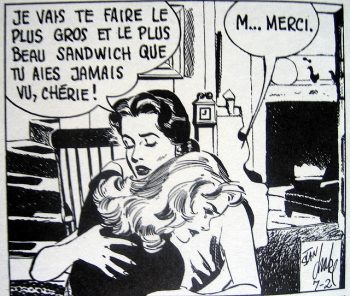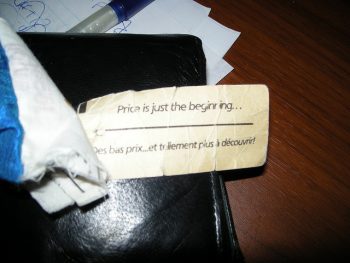Archive for 'Grammar'
French Adverbs And Their Minds Posted by John Bauer on Feb 4, 2015
There’s a cool trick to forming adverbes that lies in the history of la langue française. This trick doesn’t apply to all adverbes, only those that end in –ment. Franchement Joyeusement Seulement Artificiellement It’s easy to see how these adverbes are formed with some root and then add –ment to them. What’s less obvious is…
An Introduction to the Subjunctive Posted by Elizabeth Schmermund on Jan 26, 2015
Just the mention of the subjonctif can make French learners tremble in their boots. However, this grammatical mood is very common and exists in many languages, including in English. In French, the subjonctif is used very often and serious French learners need to be familiar with it (although there are grammatical ways of getting around using the subjunctive…
What are French Conjunctive Phrases? Posted by Elizabeth Schmermund on Jan 19, 2015
Two weeks ago, we went over les conjonctions de la langue française, including les conjonctions de coordination (car, donc, ensuite, et, mais, or, ni, ou, puis) and les conjonctions de subordination (comme, lorsque, puisque, quand, que, si, quioque). You can go back and look over that lesson here. Today, we will focus on les locutions…
That tricky French U! Posted by Josh Dougherty on Jan 6, 2015
There are many tricky parts to learning a foreign language. There’s new grammar, there are new and sometimes bizarre expressions and idioms, and there are of course new sounds. For native English speakers, there are a few sounds in French that are a little difficult to pronounce. And of course, just because you know the…
Reader Request: French Conjunctions Posted by Elizabeth Schmermund on Jan 5, 2015
Today we’re going to learn about French conjunctions. What are conjunctions? They are words or phrases that link similar words or groups of works together. In French, there are two different kinds of conjunctions: coordinating conjunctions (les conjonctions de coordination) and subordinating conjunctions (les conjonctions de subordination). These also exist in English. Coordinating conjunctions –…
Pronunciation Practice: Tongue Twisters Posted by John Bauer on Jan 1, 2015
A tongue twister, or un virelangue en français, is hard a hard to pronounce sentence, often used as a kind of game among children, but also used to clear up pronunciation problems. They are always specifically designed to be difficile de dire (hard to say), even for des locuteurs natifs (native speakers)! Just think of…
Reader Request: Si vs. Tellement vs. Tant Posted by Elizabeth Schmermund on Dec 29, 2014
In French, adverbs that express a certain quantity or intensity are called adverbes de degré or adverbes de quantité. In English, these are similarly called adverbs of quantity and are commonly used in every day speech. For example, you could say: “My friend is so generous” or “My French is much better than my German”…








